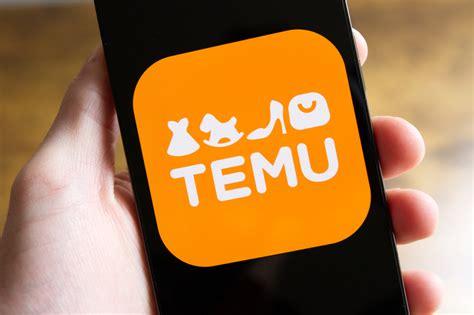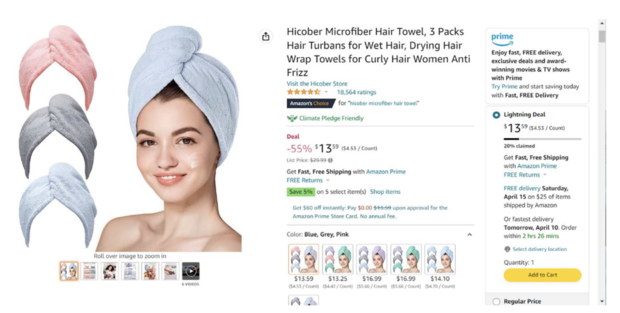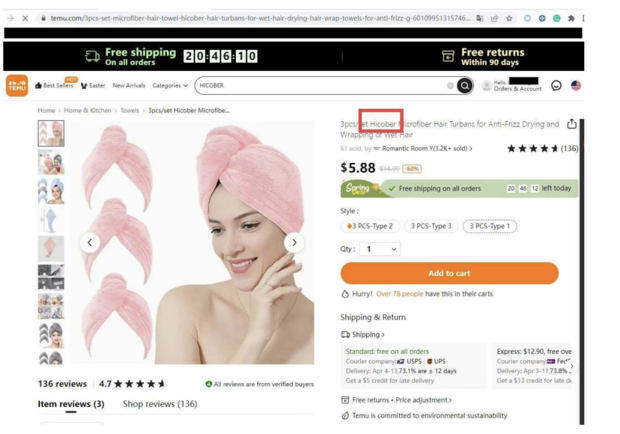Temu, a popular e-commerce site that boasts free delivery everywhere and the tag line "Shop like a billionaire," has come under scrutiny in recent months and is now being accused by sellers on Amazon of copying entire storefronts.
The online retailer is one of the most popular apps – currently No. 3 on Apple and No. 2 on Google devices – but has been given a C-minus grade by the Better Business Bureau amid complaints from customers.
"This company has scammed me" — customer reviews polarized
Like Amazon, Temu is a one-stop shop for a plethora of products, but many of the items on Temu are listed at incredibly low prices. Some customers say it's too good to be true.
The retailer typically ships products from manufacturers in China – if, that is, it ships products at all, as some customers have complained.
"This company has scammed me and ripped me off," one reviewer wrote on the Better Business Bureau site. "I had placed two orders with Temu on 05/25/2023 but the supposed order was shipped in one badly damaged and torn box. Upon receiving this order their were numerous items missing from the order."
The complaint goes on to say Temu allegedly denied the shopper a refund and customer service was unresponsive. "I am so tired of dealing with this company," the customer wrote. "This company is nothing but professional liars and scam artists!!!!"
"I believe they are scammers," another person wrote, claiming they never received the $50 worth of products they ordered from Temu. "I believe that they are preying on innocent people for profits they need to be a class action civil suit against them for false advertising and stealing money online. if anyone is interested please let me know thank you."
Another person claimed Temu advertised sales online, but once the app was downloaded, that pair of shoes promised to be $2.49 became $22.49. And once added to the cart, she said the price was increased to $29. Some shoppers said the wrong size clothing was delivered. Many said items they ordered were never delivered and complained about the lack of refunds after returns and unresponsive customer service.
Temu claims on its website it offers a "Temu Purchase Protection Program," which provides "refunds for items that do not arrive, arrive damaged, or are not as described." The refund amount, however, may not match the full price of the items since sales taxes, shipping, used coupons and credit are taken into account." The site does not allow exchanges, but says customers can return orders.
There are several videos about Temu on TikTok, and they appear to fall under two genres: videos where users share their negative experiences with the company, and haul videos, where users simply show off what they bought and how much it cost. Some of the positive reviews are from TikTok users who have discount codes or affiliate links for Temu – meaning they are either being paid or getting a discount to promote the company – which are usually disclosed in the caption of the videos.
Some people seemed genuinely happy with the products they bought. "First ever Temu order and honestly 10/10," one user wrote in the caption of a video where she opens a package with a headband, a small fan, highlighters and other products.
Another user cautioned that the products from Temu don't hold up after about a month. She said the pajamas she bought from Temu were low quality, a small fan barely worked and the color of her gold jewelry had worn off. "I'm not being picky. I paid like 87 cents for a pack of bracelets, ok? But I'm just saying, if you order, be prepared," she said. In the caption of the honest product haul she wrote: "Don't get me wrong I love Temu & my cart is full as we speak but just fyi."
Some reviewers claim Temu sold them fake Air Jordan sneakers, after the company came under fire earlier this year for selling the apparent knockoff sneakers for $50. Online retailer Shein, which was also accused of selling fake Jordans, removed them from its site, but several versions of the seemingly counterfeit Nike shoes are still available on Temu.
In a statement to Business Insider about the knockoffs, Shein said it "takes all claims of infringement seriously" and removed the product in question, adding that third-party sellers are required certify heir products do not infringe IP and to comply with the company's policies.
CBS News has reached out to Temu for comment and is awaiting response.
Is Temu reliable?
The Better Business Bureau, which analyzes companies based on reviews and complaints and also offers a place for people to share feedback on businesses, says it gave Temu a C-minus rating in part because 581 complaints have been submitted against business since it opened last July.
While many customers have called the company a scam in their complaints, the BBB has not designated it as a scam or an unsafe company.
Temu is not accredited by the BBB, which says its accreditation requires a business to build trust, advertise honestly, be responsive, embody integrity and meet other standards. The lack of accreditation could simply mean Temu has not sought BBB accreditation, which costs a fee.
The U.S.-China Economic Security Review Commission recently opened an investigation into the data risks, sourcing violations, and trade loopholes of "fast fashion" sites like Temu and Shein.
The commission did not outright say they found Temu's app or website to be unsafe, but said the company's "lack of affiliation with established brands has brought concerns of product quality as well as accusations of copyright infringement," the commission said in its issue brief, released in April.
The investigation found Temu is well positioned to exploit social media platforms and "has invested heavily in social media marketing, purchasing 8,900 ads across Meta platforms in January 2023 alone."
According to the commission's findings, the company frequently hires social media users as "influencers," who are typically people with large followings that can help promote companies. Temu, however, only requires their "influencers" have 300 followers. These influencers are encouraged to post "haul" videos and recommend products to their followers.
The commission says Temu's rapid success raises flags about its business practices and that its parent company, PDD Holdings was accused of "extreme overtime," by the China Labor Watch. The company, which also runs online retailer Pinduoduo in China, has required employees to work 380 hours per month – more than double the average in the U.S., which is about 160 hours a month or 40 hours a week – according to the commission.
On top of that, earlier this year, the commission reported a CNN investigation found malware on Pinduoduo's Google Android app, allowing it to access "private messages, change settings, view data from other apps, and prevent uninstallation." CNN spoke with half a dozen cybersecurity researchers from Asia, Europe and the U.S. and "multiple experts identified the presence of malware" on the app. Google suspended the app following an investigation.
The commission did not disclose any findings, if any, about Temu's app.
Alleged Amazon storefront "cloning"
Like Amazon, Temu offers products from third-party sellers – individuals or companies that sell their products through these e-commerce sites. Third-party sellers that have what Amazon calls "storefronts" – pages for their brand where their products are sold – have accused Temu of "cloning" those storefronts.
In some cases, the sellers have sued after they say their Amazon storefront and products had been duplicated on Temu without their consent.
A company that trademarked Hicober – a brand of hair towels sold on Amazon – sued Temu and another online retailer, claiming they were selling hair towels branded as Hicober without permission and without authorized use of the trademark. In its motion to dismiss the complaint, Temu said it had removed all the allegedly infringing products and that "[a]ny infringement was committed by the third-party sellers who manufactured the towels [and] created the product listings," not Temu.
Shein, another e-commerce site that has third-party sellers and also has an Amazon storefront in addition to its own website and app, filed a lawsuit against Temu earlier this year. The suit claims Temu copied merchandise listings from Shein, which violates copyrights, since Shein owns the rights to several photos on their site.
The suit also alleges Temu hired influencers to promote its app online – while making negative comments about Shein. The suit alleges Temu told influencers to say things like: "Shein is not the only cheap option for clothing! Check Temu.com out, cheaper and way better quality"; and "Looking for clothes better than Shein but cheaper than Revolve? Check Temu.com out."
Temu has filed a motion to dismiss several of the claims, including by arguing that the quoted statements "were merely given as 'references' for the influencers as they considered how to caption their own posts."
CBS News has reached out to Shein for comment and is awaiting response.
An Amazon seller named David said in an interview with Wired this week that he was browsing Temu and saw two listings that looked nearly identical to his Amazon page – but the craft products he sells were being offered at 30% cheaper on Temu. He has since written to Temu several times, but they are not taking down the alleged duplicates, he said. He is now considering taking legal action.
In a statement to CBS News, a representative for Amazon said they "strongly condemn this type of activity." The company advises brands who suspect their Amazon product information or images are being copied to contact Amazon's Counterfeit Crimes Unit so they can investigate.
The company not only helps sellers "obtain and enforce their intellectual property rights" but also works to "hold counterfeiters accountable and stop them from selling counterfeits anywhere," the spokesperson said.
In 2022, they seized and disposed of more than 6 million counterfeit products and the Counterfeit Crimes Unit sued or referred for investigation more than 1,300 times in an effort to stop the sale of counterfeits.





